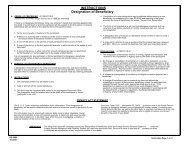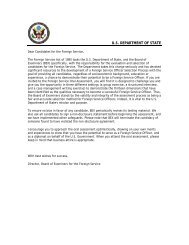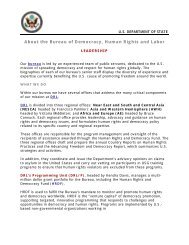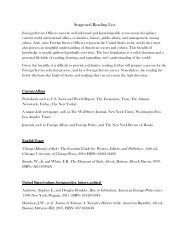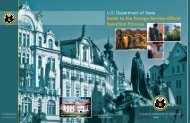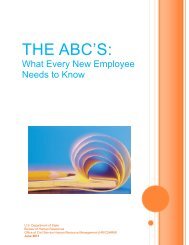Foreign Service Officer: ORAL ASSESSMENT STUDY GUIDE
Foreign Service Officer: ORAL ASSESSMENT STUDY GUIDE
Foreign Service Officer: ORAL ASSESSMENT STUDY GUIDE
Create successful ePaper yourself
Turn your PDF publications into a flip-book with our unique Google optimized e-Paper software.
TO:<br />
FROM:<br />
SUBJECT:<br />
Members of the Working Group on Special Projects<br />
Peace Corps Office Manager – Todd Kowalski<br />
Public School Reform (K12)<br />
Peace Corps Director Gudrun DeSouliers had planned to attend your meeting today but has been<br />
unavoidably detained. She asked me to pass on the following information on a public school<br />
reform project proposed by Minister of Education Ibrahim Kittab and urges you to fund this<br />
worthy project fully.<br />
Widespread illiteracy is one of Kuman's most difficult development challenges and a poor basis<br />
for its emerging representative government. About 90% of Kumanis are illiterate. Existing<br />
schools are under-funded, overcrowded and inadequately staffed. Urban schools must rely on<br />
grossly outdated textbooks and poorly prepared teachers. Rural schools are controlled by<br />
Januban fundamentalists.<br />
The Minister plans to establish 50 new rural primary schools and 12 regional high schools in the<br />
next year. High schools will draw the best students from the primary schools. Old textbooks<br />
will be replaced with apolitical textbooks developed by Western-educated Kumanis, with help<br />
from two Peace Corps experts. The Government will give full scholarships for the top 10<br />
percent of high-school graduates to attend Asima’s National University or universities abroad, in<br />
return for teaching in public schools for two years after graduation. The Peace Corps will also<br />
provide volunteer English teachers, while the State Department’s Bureau of Educational and<br />
Cultural Affairs will provide its information and educational programs for use in the new public<br />
schools<br />
The total cost of the project is $495,000. The World Bank and the United Kingdom are<br />
contributing $205,000 and $100,000, respectively, to train and hire new teachers. We have been<br />
asked to provide $190,000: $115,000 for the purchase of building materials for school<br />
construction (local villagers will provide the labor) and another $75,000 for the publication of<br />
new textbooks.<br />
Political Counselor Hedwig Bigg says that Kuman’s democratic experiment might fail unless the<br />
current Government meets rising public demands, across the political spectrum, for education<br />
reform. In particular, the fundamentalist extremists’ growing appeal among the educated young<br />
is due to frustration with an educational system that does not prepare them for careers in a freemarket<br />
economy or the bureaucracy of new democratic institutions. An educated electorate<br />
would not only provide a better basis for democracy but could lessen support for religious<br />
extremism, particularly in rural areas, by giving all Kumanis, for the first time, a chance at higher<br />
education and economic advancement.<br />
Public Affairs <strong>Officer</strong> Art Pressman adds that our public diplomacy efforts have been severely<br />
limited by Kuman's poor school system, the population's limited contact with the outside world,<br />
and still lingering anti-Western Marxist leanings or, increasingly, fundamentalist Januban



